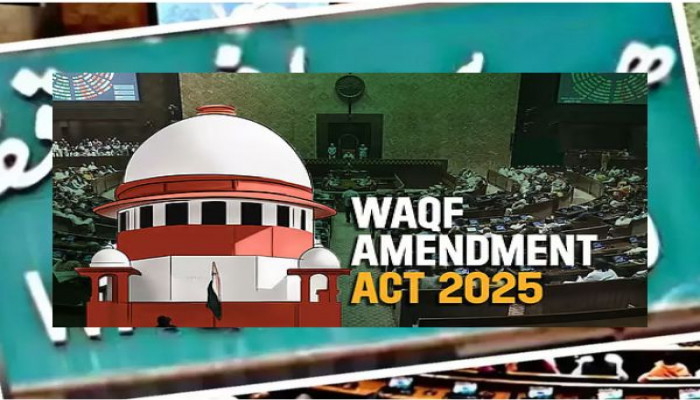Supreme Court to continue hearings on Waqf law, no interim order as of now
- In Reports
- 05:18 PM, Apr 16, 2025
- Myind Staff
On Wednesday, the Supreme Court of India refused to stay the operation of the Waqf (Amendment) Act, 2025, passed by the Parliament. Despite the challenges, the court has agreed to hear a batch of over 100 petitions challenging the constitutional validity of the Act.
A bench led by Chief Justice Sanjiv Khanna, along with Justices Sanjay Kumar and K V Viswanathan, highlighted the ongoing violence linked to the legislation and scheduled a follow-up hearing for Thursday.
The bench stated, “Several provisions of the Waqf (Amendment) Act are salutary, but few, including the extent and ambit of 'waqf by user' and the number of non-Muslim members in the Waqf Council, need clarification.”
The amendment was passed with the purpose of regulating the authentication of waqf properties and permitting the appointment of non-Muslims to the Waqf Council and the Aukaf Board. However, its provisions related to “waqf by user” and the composition of the Waqf Council have led to legal opposition and violence in the country.
Waqf by User
"Waqf by user" is a practice under which a property is treated as a waqf based on its continuous and long-standing religious or charitable use without a formal legal declaration. This custom is deeply rooted in history and holds importance in privy council judgments.
The Supreme Court questioned how such waqfs could be officially registered. “How will you register such waqfs by user? What documents will they have? It will lead to undoing something. Yes, there is some misuse. But there are genuine ones also. I have gone through privy council judgments also. Waqf by user is recognised. If you undo it then it will be a problem. Legislature cannot declare a judgment, order or decree as void. You can only take the basis,” the bench questioned.
The court proposed to pass an order on the denotification of any property already declared as waqf, including those categorised under “waqf by user.” However, the Centre opposed this proposal and requested a formal hearing on the matter.
Non-Muslims in Waqf Council
The court shed light on the issue of religious representation within the Waqf Council. It questioned the reasoning behind appointing non-Muslim members to the Council. The bench stated a hypothetical scenario, asking whether the government would consider including Muslims in Hindu religious trusts. The court stated, in keeping with that view, that while ex-officio members can be of any faith, other appointed members must be Muslims.
Property Rights Concerns
The case has attracted attention from across the country due to the diversity of petitioners opposing the legislation. The pleas argue that the Act violates constitutional rights, weakens property rights, and allows the Waqf Boards to unlawfully take control of land across the country.
One of the important petitions was filed by advocate Hari Shankar Jain, who has also been actively involved in the Gyanvapi mosque and Mathura Idgah cases. Jain’s plea calls for the complete removal of multiple provisions from both the original Waqf Act, 1995 and its 2025 amendments. According to him, the laws are being exploited to "illegally amass immovable properties" belonging to public institutions, government agencies, village common lands (gram samaj), and Hindu temples.
His counsel, advocate Vishnu Shankar Jain, requested that his plea be combined with other similar petitions for a joint hearing. These include petitions from a wide range of political leaders, religious scholars, and civil rights groups.
Diversity of Petitioners
The petitions of this opposition have displayed a cross-section of Indian society. Some of the petitioners are AIMIM president Asaduddin Owaisi, AAP MLA Amanatullah Khan, the Association for the Protection of Civil Rights (APCR), Darul Uloom principal Arshad Madani, Islamic body Samastha Kerala Jamiathul Ulema, advocate Taiyyab Khan Salmani, Social Democratic Party of India (SDPI) member Mohd Shafi, and All India Muslim Personal Law Board general secretary Mohd Fazlurrahim.
Rashtriya Janata Dal (RJD) MP Manoj Kumar Jha has also approached the court, challenging the principles of the amended law, which has added more weight to this issue.
The Supreme Court has stated that the hearing will resume tomorrow, as the bench continues to find the balance between religious freedoms, property rights, and legislative authority.







Comments